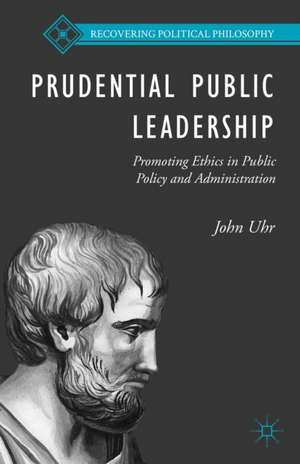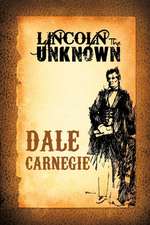Prudential Public Leadership: Promoting Ethics in Public Policy and Administration: Recovering Political Philosophy
Autor J. Uhren Limba Engleză Hardback – 9 iul 2015
| Toate formatele și edițiile | Preț | Express |
|---|---|---|
| Paperback (1) | 381.43 lei 6-8 săpt. | |
| Palgrave Macmillan US – 6 feb 2016 | 381.43 lei 6-8 săpt. | |
| Hardback (1) | 386.81 lei 6-8 săpt. | |
| Palgrave Macmillan US – 9 iul 2015 | 386.81 lei 6-8 săpt. |
Din seria Recovering Political Philosophy
-
 Preț: 382.95 lei
Preț: 382.95 lei -
 Preț: 382.75 lei
Preț: 382.75 lei -
 Preț: 386.61 lei
Preț: 386.61 lei -
 Preț: 384.86 lei
Preț: 384.86 lei -
 Preț: 357.43 lei
Preț: 357.43 lei - 15%
 Preț: 702.24 lei
Preț: 702.24 lei - 18%
 Preț: 726.06 lei
Preț: 726.06 lei -
 Preț: 382.75 lei
Preț: 382.75 lei -
 Preț: 265.36 lei
Preț: 265.36 lei -
 Preț: 211.29 lei
Preț: 211.29 lei - 15%
 Preț: 646.75 lei
Preț: 646.75 lei - 18%
 Preț: 728.28 lei
Preț: 728.28 lei - 8%
 Preț: 487.95 lei
Preț: 487.95 lei - 15%
 Preț: 641.71 lei
Preț: 641.71 lei - 18%
 Preț: 786.98 lei
Preț: 786.98 lei -
 Preț: 201.06 lei
Preț: 201.06 lei -
 Preț: 214.57 lei
Preț: 214.57 lei - 15%
 Preț: 579.20 lei
Preț: 579.20 lei -
 Preț: 176.74 lei
Preț: 176.74 lei - 15%
 Preț: 577.07 lei
Preț: 577.07 lei - 15%
 Preț: 583.61 lei
Preț: 583.61 lei - 18%
 Preț: 777.20 lei
Preț: 777.20 lei - 15%
 Preț: 693.57 lei
Preț: 693.57 lei - 15%
 Preț: 698.30 lei
Preț: 698.30 lei - 18%
 Preț: 727.97 lei
Preț: 727.97 lei - 18%
 Preț: 786.18 lei
Preț: 786.18 lei -

Preț: 386.81 lei
Nou
Puncte Express: 580
Preț estimativ în valută:
74.02€ • 80.38$ • 62.18£
74.02€ • 80.38$ • 62.18£
Carte tipărită la comandă
Livrare economică 23 aprilie-07 mai
Preluare comenzi: 021 569.72.76
Specificații
ISBN-13: 9781137506481
ISBN-10: 1137506482
Pagini: 202
Ilustrații: XIII, 202 p.
Dimensiuni: 140 x 216 x 15 mm
Greutate: 0.39 kg
Ediția:2015
Editura: Palgrave Macmillan US
Colecția Palgrave Macmillan
Seria Recovering Political Philosophy
Locul publicării:New York, United States
ISBN-10: 1137506482
Pagini: 202
Ilustrații: XIII, 202 p.
Dimensiuni: 140 x 216 x 15 mm
Greutate: 0.39 kg
Ediția:2015
Editura: Palgrave Macmillan US
Colecția Palgrave Macmillan
Seria Recovering Political Philosophy
Locul publicării:New York, United States
Cuprins
1. Preview: Political Theory and Public Administration 2. Leadership Rhetoric: Defining the Terms 3. Prudential Leadership: The Power of Practical Reason 4. Leadership Dilemmas: Debating Dirty Hands 5. Pragmatism: Mill and the Ethics of Impact 6. Principle: Kant and the Ethics of Intent 7. Prudence: Aristotle and the Ethics of Virtue 8. Leadership Accountability: Democracy and Deliberation 9. Review: Ethics and Leadership in Public Administration
Recenzii
“John Uhr has written a rich and challenging work of political philosophy for public leaders, in order to demonstrate the relevance of political philosophy to practitioners in democratic societies. Specifically, he aims to retrieve Aristotle, to restore Aristotle’s rightful place among theorists of the ethics of leadership.” (Kenneth Winston, Political Theory, Vol. 14 (1), March, 2016)
"John Uhr brings a refreshing and thoughtful treatment of Aristotle's political philosophy to contemporary understandings of public administrative leadership ethics in Prudential Public Leadership. As typical of his excellent scholarship, Uhr's erudition and clear writing make Aristotelian thought come alive for our field. This is an innovative contribution to public administration literature that will certainly attract scholarly attention." - Terry L. Cooper, Maria B. Crutcher Professor in Citizenship and Democratic Values, University of Southern California, USA
"John Uhr's Prudential Public Leadership provides valuable new insights into ethics and leadership in public administration. Combining a nuanced theoretical engagement with Aristotle, Kant and Mill, with a thoughtful appreciation of the competing practical demands of virtue, duty and utility, Uhr makes a compelling case for the primacy of prudence or judgment for good leadership in public administration." - Haig Patapan, Director, Centre for Governance and Public Policy, Griffith University, Australia
"Beginning by identifying three central issues that define democratic leadership the problems of rhetoric, of practical reason, and of 'dirty hands' Uhr goes on to examine three philosophical perspectives for addressing these problems, considering the extent to which Millian utilitarianism, Kantian deontology, and Aristotelian virtue ethics can inform the study and practice of leadership. Insightful, erudite, and eminently readable, Uhr makes a compelling case for bringing social science, history, and philosophy into dialogue in a unique and fruitful way." - Stephen G. Salkever, Mary Katharine Woodworth Professor, Bryn Mawr College, USA
"Uhr reinvigorates the study of public ethics with a rich and nuanced understanding of the historical foundations of three three major schools. He illustrates with great textual dexterity and historical awareness how the sources of so much modern public ethics Aristotle, Kant, Mill provide a far more nuanced and realistic approach to how to connect ethics and political action than their followers." - J. Patrick Dobel, John & Marguerite Corbally University Chair of Public Service, University of Washington
"John Uhr brings a refreshing and thoughtful treatment of Aristotle's political philosophy to contemporary understandings of public administrative leadership ethics in Prudential Public Leadership. As typical of his excellent scholarship, Uhr's erudition and clear writing make Aristotelian thought come alive for our field. This is an innovative contribution to public administration literature that will certainly attract scholarly attention." - Terry L. Cooper, Maria B. Crutcher Professor in Citizenship and Democratic Values, University of Southern California, USA
"John Uhr's Prudential Public Leadership provides valuable new insights into ethics and leadership in public administration. Combining a nuanced theoretical engagement with Aristotle, Kant and Mill, with a thoughtful appreciation of the competing practical demands of virtue, duty and utility, Uhr makes a compelling case for the primacy of prudence or judgment for good leadership in public administration." - Haig Patapan, Director, Centre for Governance and Public Policy, Griffith University, Australia
"Beginning by identifying three central issues that define democratic leadership the problems of rhetoric, of practical reason, and of 'dirty hands' Uhr goes on to examine three philosophical perspectives for addressing these problems, considering the extent to which Millian utilitarianism, Kantian deontology, and Aristotelian virtue ethics can inform the study and practice of leadership. Insightful, erudite, and eminently readable, Uhr makes a compelling case for bringing social science, history, and philosophy into dialogue in a unique and fruitful way." - Stephen G. Salkever, Mary Katharine Woodworth Professor, Bryn Mawr College, USA
"Uhr reinvigorates the study of public ethics with a rich and nuanced understanding of the historical foundations of three three major schools. He illustrates with great textual dexterity and historical awareness how the sources of so much modern public ethics Aristotle, Kant, Mill provide a far more nuanced and realistic approach to how to connect ethics and political action than their followers." - J. Patrick Dobel, John & Marguerite Corbally University Chair of Public Service, University of Washington
Notă biografică
John Uhr is Professor of Political Science at the Australian National University. He has been the head of the University's Policy and Governance Program, directing the masters of public policy and administration degrees. He is now Head of the Centre for the Study of Australian Politics, teaching political theory and comparative politics. His recent books include Studies in Australian Political Rhetoric (2014), How Power Changes Hands (2011), Public Leadership (2008), Terms of Trust (2005), and Deliberative Democracy in Australia (1998).





